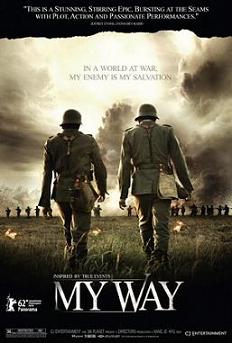
Main Page
Interviews Menu
Alphabetical Menu
Chronological Menu

CJ Entertainment releases My Way on April 20th, 2012 at AMC Empire 25, Village East Cinemas, City Cinemas Beekman Theater and AMC/Loews Ridgefield Park. NYC MOVIE GURU: How did you find the right balance between entertaining the audience and provoking them emotionally? Kang Je-kyu: Itís the directorís biggest role to find the message between what the message he wants to say as well as getting the audience to be entertained. Thatís my constant struggle in deciding how to deal with that. Instead of trying to calculate what an audience finds interesting, though, itís really important to trust my interests and the story that I want to tell. NYC MOVIE GURU: What was your process of deciding how intense the violence should be? KJK: Itís not just violence; itís war. The main conundrum really was ďHow much do you show?Ē because the violence is actually integral to part of the understanding of the movie. In reality, if the true brutality of war is, say, 100, what I showed in the film was like 50 or 10. NYC MOVIE GURU: What did you learn about filmmaking after your previous experience making a war film, Tae Guk Gi? KJK: Between having done Tae Guk Gi and this film, I had the opportunity to contemplate about the nature of war and to be able to tease out more. After the film was released in Korea and Japan and seeing how audiences reacted to it, thereís a whole deeper level of considering the relationship between a film and its popularity, and the nature of making movies. Previously, Tae Guk Gi has this amazingly successful run where everything was just a new level of blockbuster, and so I was telling the story that I wanted to tell, and everybody loved it. My Way is a story I really wanted to tell, but people started having problems with it. Iím really focusing on my identity now and the raison d'Ítre for being a filmmaker. NYC MOVIE GURU: How much of the film was shot on digital? What are the benefits of digital filmmaking? KJK: 90% of My Way is shot on digital. I really worked a lot on the pre-production stage of testing against it because there was a lingering question about whether the filmís quality would stand up and look like it was shot on film. I found out that in the digital inter-negative, with some additional tweaking, I was able to make it look just as good as film. There were 5,500 shots in this film. Literally the number of dailies was so large that if I were working with film, the time it would take to load and reload and rewind film started to become a factor. Doing it digitally saved that amount of time. Of the 5,500 total shots, 2,200 of them required some sort of CGI work done to it, so in that case, shooting on film would have made that a timely process. NYC MOVIE GURU: Did you consider shooting the film in 3D? How do you feel about 3D in general? KJK: I was actually very interested in shooting in 3D, and received a lot of proposals on doing it, but ultimately because the whole shoot was 156 days and the budget went completely out of proportion, I had to put that option aside. I generally like 3D and to embrace new technologies that would maximize the audienceís reception of the film. 3D is a process that gives the audience a more immersive experience. I plan to try to use it in the future. NYC MOVIE GURU: What are the basic elements that turn a war film into a classic? KJK: If movies are fundamentally about humanity, and life and death, war films as a genre is probably the most dramatic case of that, and itís really where it all comes to a boil. Itís a really wonderful genre that combines people and history. War films that I consider to be classic include The Bridge on the River Kwai, The Thin Red Line and Apocalypse Now. NYC MOVIE GURU: How realistic do you think it is to expect world peace? KJK: Because of human nature, itís impossible to completely eradicate war, but since the current amount of war is so large, we can certainly work on reducing the amount. NYC MOVIE GURU: How would you define a good soldier? KJK: The reason why thatís such a difficult question to answer is because I think that soldiers fundamentally have a duality. The definition of a good soldier, in some ways, is somebody who follows a chain of command. The army does not work unless everybody follows orders. Itís based on that order. But if the command is a bad one, would the soldier who goes against that be considered a good soldier? Itís very hard to say. Having done two war movies, I think about that question a lot. There doesnít seem to be a right answer to it. NYC MOVIE GURU: How do you overcome the emotional impact of making such a powerful warm film? KJK: A war film is literally about people in war, and even though Iím the filmmaker, it doesnít give me the ability to rise above the threshold because I have all the answers and you see it like a chess piece. I, along with the cast and crew, share the pain and the emotional journey. Itís an extremely difficult project to do. I desire a form of escapism afterwards, so then I end up watching movies like What Happened in Vegas. Main Page Interviews Menu Alphabetical Menu Chronological Menu ______________________________________________________ |
The NYC Movie Guru
themovieguru101@yahoo.com
Privacy Policy